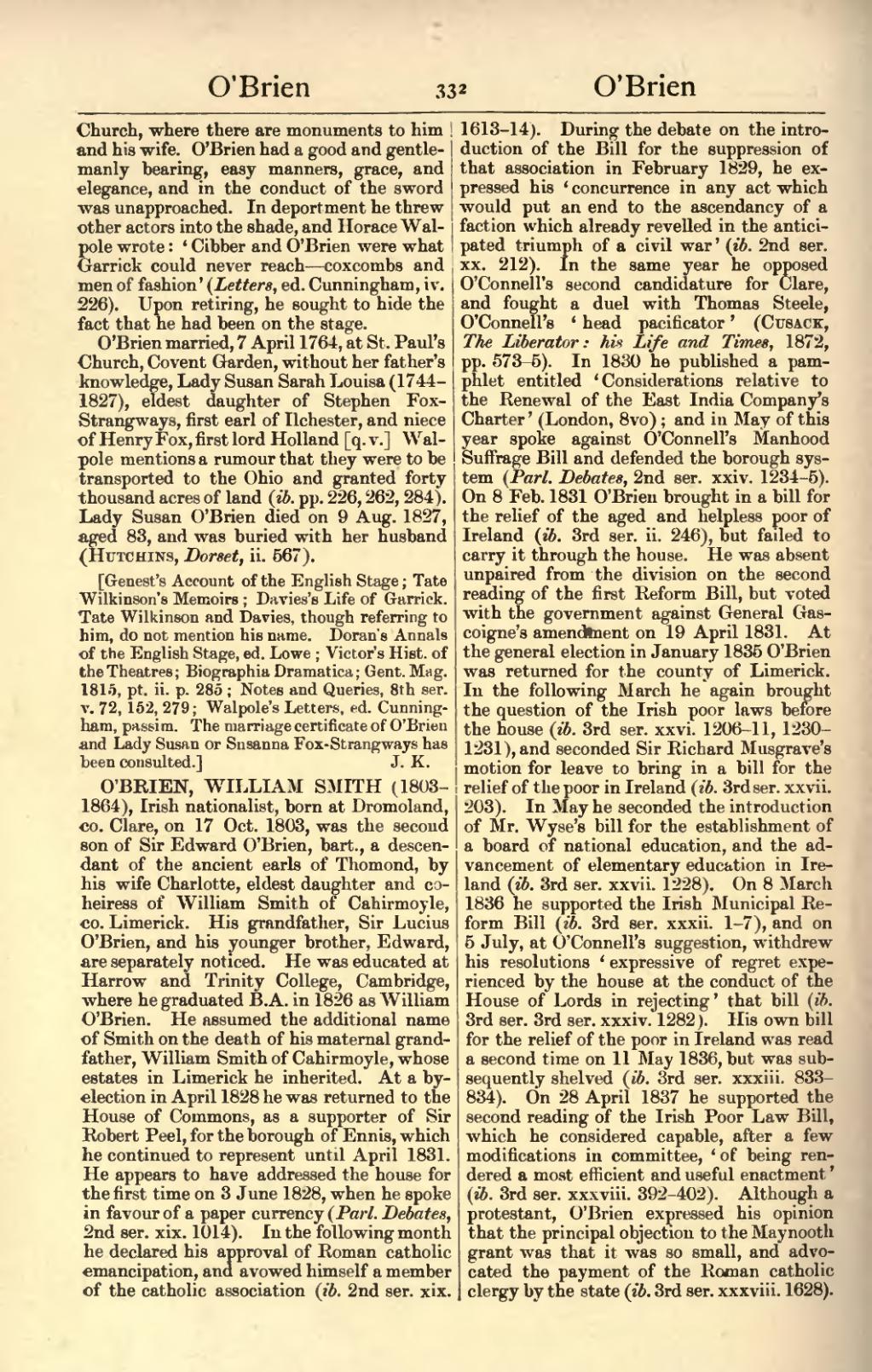Church, where there are monuments to him and his wife. O'Brien had a good and gentlemanly bearing, easy manners, grace, and elegance, and in the conduct of the sword was unapproached. Horace Walpole wrote: ‘Cibber and O'Brien were what Garrick could never reach—coxcombs and men of fashion’ (Letters, ed. Cunningham, iv. 226). Upon retiring, he sought to hide the fact that he had been on the stage.
O'Brien married, 7 April 1764, at St. Paul's Church, Covent Garden, without her father's knowledge, Lady Susan Sarah Louisa (1744–1827), eldest daughter of Stephen Fox-Strangways, first earl of Ilchester, and niece of Henry Fox, first lord Holland [q. v.] Walpole mentions a rumour that they were to be transported to the Ohio and granted forty thousand acres of land (ib. pp. 226, 262, 284). Lady Susan O'Brien died on 9 Aug. 1827, aged 83, and was buried with her husband (Hutchins, Dorset, ii. 567).
[Genest's Account of the English Stage; Tate Wilkinson's Memoirs; Davies's Life of Garrick. Tate Wilkinson and Davies, though referring to him, do not mention his name. Doran's Annals of the English Stage, ed. Lowe; Victor's Hist. of the Theatres; Biographia Dramatica; Gent. Mag. 1815, pt. ii. p. 285; Notes and Queries, 8th ser. v. 72, 152, 279; Walpole's Letters, ed. Cunningham, passim; Lichtenstein's Holland House, ii. passim. The marriage certificate of O'Brien and Lady Susan or Susanna Fox-Strangways has been consulted.]
O'BRIEN, WILLIAM SMITH (1803–1864), Irish nationalist, born at Dromoland, co. Clare, on 17 Oct. 1803, was the second son of Sir Edward O'Brien, bart., a descendant of the ancient earls of Thomond, by his wife Charlotte, eldest daughter and coheiress of William Smith of Cahirmoyle, co. Limerick. His grandfather, Sir Lucius O'Brien [q. v.], and his younger brother, Edward [q. v.], are separately noticed. He was educated at Harrow and Trinity College, Cambridge, where he graduated B.A. in 1826 as William O'Brien. He assumed the additional name of Smith on the death of his maternal grandfather, William Smith of Cahirmoyle, whose estates in Limerick he inherited. At a by-election in April 1828 he was returned to the House of Commons, as a supporter of Sir Robert Peel, for the borough of Ennis, which he continued to represent until April 1831. He appears to have addressed the house for the first time on 3 June 1828, when he spoke in favour of a paper currency (Parl. Debates, 2nd ser. xix. 1014). In the following month he declared his approval of Roman catholic emancipation, and avowed himself a member of the catholic association (ib. 2nd ser. xix. 1613–14). During the debate on the introduction of the Bill for the suppression of that association in February 1829, he expressed his ‘concurrence in any act which would put an end to the ascendancy of a faction which already revelled in the anticipated triumph of a civil war’ (ib. 2nd ser. xx. 212). In the same year he opposed O'Connell's second candidature for Clare, and fought a duel with Thomas Steele, O'Connell's ‘head pacificator’ (Cusack, The Liberator: his Life and Times, 1872, pp. 573–5). In 1830 he published a pamphlet entitled ‘Considerations relative to the Renewal of the East India Company's Charter’ (London, 8vo); and in May of this year spoke against O'Connell's Manhood Suffrage Bill and defended the borough system (Parl. Debates, 2nd ser. xxiv. 1234–5). On 8 Feb. 1831 O'Brien brought in a bill for the relief of the aged and helpless poor of Ireland (ib. 3rd ser. ii. 246), but failed to carry it through the house. He was absent unpaired from the division on the second reading of the first Reform Bill, but voted with the government against General Gascoigne's amendment on 19 April 1831. At the general election in January 1835 O'Brien was returned for the county of Limerick. In the following March he again brought the question of the Irish poor laws before the house (ib. 3rd ser. xxvi. 1206–11, 1230–1231), and seconded Sir Richard Musgrave's motion for leave to bring in a bill for the relief of the poor in Ireland (ib. 3rd ser. xxvii. 203). In May he seconded the introduction of Mr. Wyse's bill for the establishment of a board of national education, and the advancement of elementary education in Ireland (ib. 3rd ser. xxvii. 1228). On 8 March 1836 he supported the Irish Municipal Reform Bill (ib. 3rd ser. xxxii. 1–7), and on 5 July, at O'Connell's suggestion, withdrew his resolutions ‘expressive of regret experienced by the house at the conduct of the House of Lords in rejecting’ that bill (ib. 3rd ser. xxxiv. 1282). His own bill for the relief of the poor in Ireland was read a second time on 11 May 1836, but was subsequently shelved (ib. 3rd ser. xxxiii. 833–834). On 28 April 1837 he supported the second reading of the Irish Poor Law Bill, which he considered capable, after a few modifications in committee, ‘of being rendered a most efficient and useful enactment’ (ib. 3rd ser. xxxviii. 392–402). Although a protestant, O'Brien expressed his opinion that the principal objection to the Maynooth grant was that it was so small, and advocated the payment of the Roman catholic clergy by the state (ib. 3rd ser. xxxviii. 1628).
